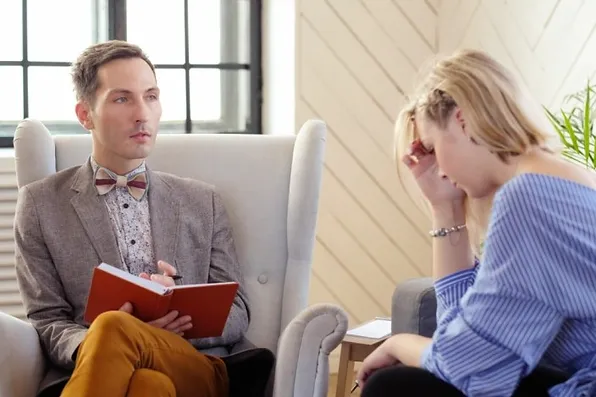Psychotherapy is a method of treatment that is psychological in nature and meets the psychological needs of a person specially trained for good behaviour.
Types of psychotherapy –
-
Psychoanalysis psychotherapy
-
Psychoanalytical psychotherapy
-
Group psychotherapy
-
Psychodrama
-
Family therapy
-
Marital or couples therapy
-
Behaviour therapy
-
Hypnosis
-
Cognitive therapy
1. Psychoanalysis psychotherapy –
-
Psychoanalysis begins with the patient undergoing hypnosis.
-
Modern advances in psychoanalysis focus on the increased understanding of the ego’s functions.
-
The role of Ali relationship (early childhood issues bracket close) And the relationship between the analyst and the person.
-
The chief requirement of psychoanalysis is the gradual integration of the previously expressed materials into the total structure of the personality.
-
It is a slow process requiring the analyst to maintain a balance between the interpretation of unconscious materials and the patient’s ability to deal with increasing awareness.
-
If the work proceeds too fast, the patient may experience the analysis as a new trauma.
-
Psychoanalysis usually takes 3 to 6 years, sometimes even longer, with 4 to 5 sessions per week lasting 45 to 50 minutes.
2. Psychoanalytical psychotherapy-
-
This takes as its focus the current conflict and the current dynamics and analyses the patients’ problems with other people and themselves.
-
It is characterised by interviewing and discussion techniques that use free association much less frequently.
It is of two types –
-
Insight-oriented psychotherapy
-
Supportive psychotherapy
1. Insight Oriented psychotherapy –
-
Insight is the understanding of a person’s or a patient’s psychological functioning and personality.
-
The psychiatrist, psychologist and analyst emphasise insight-oriented Psychotherapy benefits the patient by providing new insights into the current dynamics of feelings, responses, behaviour, and, most importantly, current relationships with others.
-
It is the treatment of choice for a patient who has fairly adequate ego strength but who, for one reason or other, should not or can not undergo psychoanalysis.
2. Supportive psychotherapy or relationship-oriented psychotherapy –
-
This offers support from an authority figure during a period of illness, turmoil ( difficult phase in life) or temporary decompensation.
-
It has the goal of restoring or strengthening the defences and integrating capacities that have been impaired.
3. Group psychotherapy –
-
A group is a fundamental social unit.
-
Group psychotherapy is a treatment in which carefully selected emotional people are placed into a group guided by a trained therapist to help one another to effect a personality change.
-
By using a variety of technical processes and theories, the leader uses the group members’ interaction to make them change.
-
The role of a therapist is as a facilitator.
-
The size of the gap ranges from 3 to 15 patients, but 8 to 10 patients is usually sufficient.
-
The session for the group is once a week with a duration of 1 to 2 hours, although the duration may be extended.
-
The groups can be Homo geniuses or Heathrow geniuses, open or closed.
-
The group enables the patient to gain introspective (you think about yourself) insight into their personality, functioning, and suspension of previous coping strategies.
4. Psychodrama –
-
Psychodrama is a method of group psychotherapy in which personalities make up interpersonal relationships, conflicts, and emotional problems are explored using a specific dramatic method.
-
Psychodrama concentrates on any specific aspect of functioning for ie: A family or community situation, unconscious attitude or an image and future situation.
-
Symptoms such as delusions and hallucinations can also be acted out.
-
Various roles are played, like director, protagonist and auxiliary ego.
-
The patient is in conflict with the protagonist (actor).
-
The patient chooses the auxiliary ego who represents something or someone in the protagonist’s experience.
5. Family therapy –
Therapy of the whole family as a unit is termed family therapy.
The interview technique is employed. And the goals of treatment are –
-
To resolve or reduce pathogenic conflict and anxiety within the matrix or background of interpersonal relationships.
-
And hence, the perception and fulfilment by family members of one another are emotional needs.
-
To encourage more appropriate role relationships between the sexes and generations.
-
To strengthen the capacity of individual members and the family as a whole to cope with destructive forces both inside and outside the surrounding environment.
-
To influence family identity and values so that members are oriented towards health and growth.
6. Marital therapy or couples therapy –
-
It is a form of psychotherapy designed to psychologically modify the interaction of two people who conflict with each other over one parameter or a variety of parameters.
-
In marital therapy, a trained person stabilises a therapeutic contract with the patient couple and, through definite types of communication, attempts to elevate the disturbance to reverse or change maladaptive patterns of behaviour and to encourage personality, growth and development.
7. Behaviour therapy –
-
The fundamental tenet of behaviour therapy is that change in maladaptive behaviour can occur without an understanding of its underlying causes.
-
It is based on the principles of learning theories.
8. Hypnosis –
Hypnosis is a type of psychotherapy in which a person can respond to appropriate suggestions by experiencing changes in their principles, memory, and mood.
-
This method is used as a form of therapy or a method of investigation to recover lost memories and as a research tool.
-
Indications are substance use disorder, alcoholism, smoking, obesity et cetera.
-
It has been used to induce anaesthesia and in chronic pain, asthma et cetera.
-
The Tilak session is easily achieved by hypnosis.
9. Cognitive therapy or cognitive behaviour therapy-
-
Cognitive therapy was developed by Aaron and Beck.
-
It is a short-term and structured therapy that uses active collaboration between the patient and the therapist to achieve their therapeutic goals.
-
It has been mainly applied to depression.
-
The duration is once a week for 15 to 25 weeks.
Forms of psychotherapy-
1. Advice –
– The best course of action for the therapist is to advise in such a way that it appears to be the best course of action in a specific type of situation.
– The patient has to decide whether to accept the advice or to reject it.
– If the patient accepts the advice, he believes that he is acting on his own.
– The advice is given in a very gentle way, so that the patient may adopt or modify it to suit his own needs.
2. Suggestion –
– It is an old and frequent method of treating psychoneurotic patients.
– Suggestion helps to reduce neurotic symptoms, but it does not address the underlying cause and thus is not a permanent cure. It is also less effective because it has been removed, leaving only the symptoms.
3. Exhortation –
⁃ It literally means speed or a statement strongly urging us to do something.
⁃ Exhortations to be effective must be made with sympathy and understanding.
4. Explanation –
– The therapist will explain in great detail what is causing this problem.
⁃ The best thing to do is to let the patient speak out.
– Identify his symptoms and investigate the cause of his problems on his own.
⁃ If the therapist explains the reasons, it should be expressed indirectly, so that the patient feels that he himself is finding out the course and the origin of his troubles.
5. Persuasion –
⁃ After listening to the patient’s troubles and ailments, the therapist should try to persuade him that he is sure to get well, every trouble has a remedy and that he himself achieve recovery.



